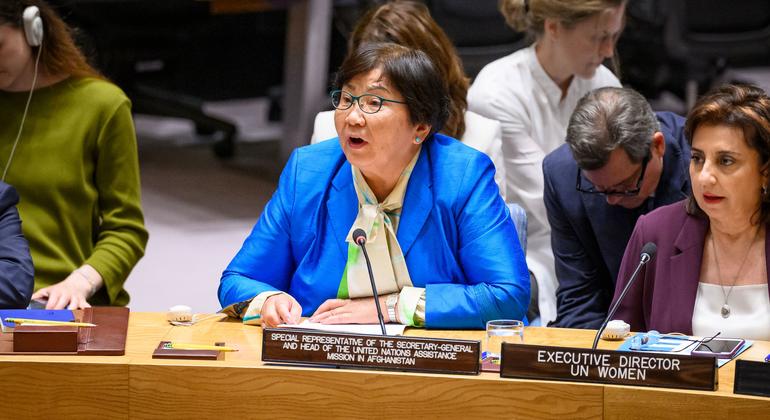Afghanistan: UN warns of growing crisis under increasingly authoritarian Taliban regime

The secretary-general’s special representative for Afghanistan, Roza Otunbayeva, said the country’s de facto rulers had imposed their own interpretation of strict Islamic law that had “brought a period of stability not seen in decades” in Afghanistan, but people were at risk of a worsening humanitarian and development crisis as international funding dwindled.
“The actual agencies are exacerbate this crisis with policies that do not adequately focus on people’s real needs and undermine the country’s economic potential.Ms. Otunbayeva said.
Humanitarian response
She noted that the current humanitarian response plan, which requires $3 billion, is only 30 percent funded.
“Have There is no indication that significant additional resources will be provided. as we approach the last quarter of the year,” said Ms. Otunbayeva.
Lack of funding has contributed to more than 200 mobile and fixed health care services closing this year, and another 171 health facilities closing in the coming months.
Furthermore, food rations in famine-stricken communities have been cut from 75% to 50% of needs and millions of vulnerable civilians are living in areas without clean water.
“The humanitarian crisis will soon become a development crisis, as Afghanistan’s young population grows rapidly and an economy cannot absorb them. and international donors are reluctant to provide development assistance largely due to restrictions on the movement and activities of half of the population,” the Special Representative said.
Restrictions on women
Ms. Otunbayeva told Council members that Afghanistan was currently shunned by the international community, noting that the Taliban would not need foreign intervention if they just “unlock the resourcefulness of their entire population”.
In July, at a meeting on Afghanistan in Doha, Qatar, UN member states and international organizations met to consider next steps to support civilians in the country.

A teenage girl in Afghanistan has to stay home because she is no longer allowed to go to school.
However, Ms Otunbayeva told the Council that progress was quickly undermined soon after the meetings were convened because the government passed a “morality monitoring law” that placed further restrictions on women.
Laws are increasingly oppressive
United Nations Women Executive Director Sima Bahous provided further details about the law, noting that it requires women and girls to cover their bodies when outside the home and prohibits them from talking in public and looking at men who are not related to them.
“Afghan women fear not only these oppressive laws but also their arbitrary application,” said Bahous. “A life lived in such circumstances is truly incomprehensible.”
The CEO also addressed the ongoing restrictions on women’s education, noting that only Afghan boys attend school and receive an education based on a curriculum whose details are known only to the Taliban.
‘We must listen to girls in Afghanistan’
In a brief to the Council, a 21-year-old Afghan woman named Mina, who is no longer a resident of the country, explained that immediate action is needed to address the restrictions that the de facto government places on women.
She shared her concern that the next generation of Afghan girls will believe they are not worthy of an education.
“We must listen to the girls in Afghanistan and do whatever we can to end this oppression.“, she said.
The briefer called on the Council to act immediately.
UN Women chief Bahous and other briefers called on the 15-member council to take action to protect women and other civilians in Afghanistan.
“We can now decide to use our political will and resources to show solidarity with Afghan women,” she said.
“I once again urge you not only to continue on this path but to be determined to carry it out.”




